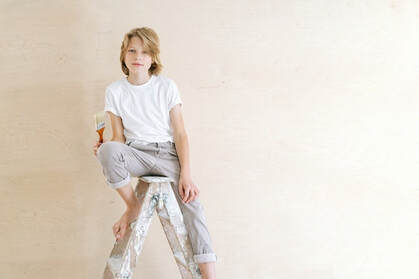| Vivian Mathews is a child psychologist and a mother of two. Besides helping children cope with everyday life, she also enjoys helping parents by writing about how to deal with children and their problems. In her free time, she likes helping out at the local animal shelter and cooking Italian dishes. |
Make both houses feel like home and not a place to visit
In the beginning, their current home will feel strange without one parent. Additionally, your children will feel like they are visiting every time you drop them off at the other house. Well, you'll want to change this as soon as possible. The most important thing is for them to feel equally comfortable and 'at home' in both houses.
You can do this by duplicating some essential items in their new home. You don't want to make them pack every time they're staying with the other parent. We only pack when we're staying somewhere as guests, right? Well, your children can't feel like guests in the other house. So, duplicate some stuff such as pajamas, clothes, shoes, toiletries, toys, books, school supplies, etc.
If they have their favorite toy, let them bring it from home to home. Another great idea is to go to the toy store with them and let them choose one thing that can be their special item for the new house. It's these little things that are helping children thrive in two homes after separation or divorce.
Giving them their own space equals helping children thrive in two homes
Involving them in the process will make them feel not only welcome but also like they belong. They won't feel like strangers in the new home, and that's exactly what will help them thrive.
Of course, if there aren't enough bedrooms in the other house, you can always let them choose the part of the house and turn it into a fun and safe place together. Put their toys, build a fort, install a gaming corner, etc.
If one parent decided to rent a home after divorce instead of buying, consult with the landlord about what changes you can make. But remember, always mention you have children before renting, so you can make an informed decision about the whole house situation that will suit your children as well.
Establish routines in both homes
This implies having scheduled bed, play, and homework time. It would be excellent to have lunch every day at the same time. Having a meal together and discussing your day can play a significant role in helping children thrive in two homes after separation or divorce.
Even though this whole situation is a big change for your children, maintaining the routine will create the feeling of everything getting back to 'normal'. And this is exactly what your children need.
Don't compete and make your children spy on another parent
Never compete with your ex-partner! Don't be jealous if your children have something at the other home that they don't have at yours. Be happy for them for having fun with the other parent. Them feeling happy and comfortable is the most important thing.
Additionally, don't by any chance ask your children to spy on the other parent for you. This will create discomfort and negative energy in both homes. Your children won't feel happy doing that, and neither will you at the end.
Instead, show them you're happy for them. Ask them about what they did with the other parent, even suggest some fun activity they can do the next time. This will create a happier environment in both homes.
Stay positive and be there for your children
David B. Younger, Ph.D. is the creator of Love After Kids, for couples that have grown apart since having children. He is a clinical psychologist and couples therapist with a web-based private practice and lives in Austin, Texas with his wife, 16-year-old son, 7-year-old daughter and 9-year-old toy poodle.






 RSS Feed
RSS Feed